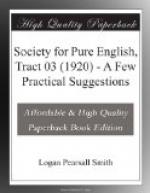[Footnote A: For the words marked with an asterisk see notes on page 10.]
The printing in italics and the restoration of foreign accents is accompanied by awkward attempts to revert to the foreign pronunciation of these words, which of course much lessens their usefulness in conversation. Sometimes this, as in nuance, or timbre* practically deprives us of a word which most of us are unable to pronounce correctly; sometimes it is merely absurd, as in ‘envelope’, where most people try to give a foreign sound to a word which no one regards as an alien, and which has been anglicized in spelling for nearly two hundred years.
Members of our Society will, we hope, do what is in their power to stop this process of impoverishment, by writing and pronouncing as English such words as have already been naturalized, and when a new borrowing appears in two forms they will give their preference to the one which is most English. There are some who may even help to enrich the language by a bolder conquest of useful terms, and although they may suffer ridicule, they will suffer it in a good cause, and will only be sharing the short-lived denunciation which former innovators incurred when they borrowed so many concise and useful terms from France and Italy to enlarge and adorn our English speech. If we are to use foreign words (and, if we have no equivalents, we must use them) it is certainly much better that they should be incorporated in our language, and made available for common use. Words like ‘garage’ and ‘nuance’ and ‘naivety’ had much better be pronounced and written as English words, and there are others, like ‘bouleverse’ and ‘bouleversement’, whose partial borrowing might well be made complete; and a useful word like malaise could with advantage reassume the old form ‘malease’ which it once possessed.




